安徽省合肥八中2012年高考适应性考试英-语-试-题
安徽省合肥八中2012届高三第一次模拟考试 英语.pdf

课文引入 作者简介 配音朗读 生字生词 内容划分 精讲点拨 探究活动 课文小结 课堂作业 结束语言 黄河滚滚奔向东南 惊涛澎湃 掀起万丈狂澜 浊流宛转 结成九曲连环 《黄河颂》 朋友! 黄河以它英雄的气魄, 出现在亚洲的原野; 它表现出我们民族的精神: 伟大而又坚强! 这里, 我们向着黄河, 唱出我们的赞歌。
我站在高山之巅,望黄河滚滚, 奔向东南。
惊涛澎湃, 掀起万丈狂澜; 浊流宛转, 结成九曲连环; 从昆仑山下 奔向黄海之边; 把中原大地 劈成南北两面。
啊!黄河! 你是中华民族的摇篮! 五千年的古国文化, 从你这儿发源; 多少英雄的故事, 在你的身边扮演! 啊!黄河! 你 是伟大坚强, 像一个巨人 出现在亚洲平原之上, 用你那英雄的体魄 筑成我们民族的屏障。
。
啊!黄河! 你一泻万丈, 浩浩荡荡, 向南北两岸 伸出千万条铁的臂膀 我们民族的伟大精神, 将要在你的哺育下 发扬滋长! 我们祖国的英雄儿女, 将要学习你的榜样, 像你一样的伟大坚强! 像你一样的伟大坚强! 生字生词 1.字音字形 澎湃( ) 哺育( ) 屏障( ) 宛转( ) 气魄( ) 巅峰( ) 狂澜( ) 2. 词语解释 哺育—— 气魄——.狂澜—— pài bǔ píng zhuǎn pò diān lán ①喂养。
②比喻培养。
①魄力。
②气势。
巨大的波浪,比喻 动荡不定的局势... 朗诵词 歌 词 望黄河 颂黄河 精讲点拨 朗诵词: 1 作者开宗明义点明了什么? 2 我们为什么要歌颂黄河? 它表现出我们民族的精神,伟大而又坚强 歌颂黄河就是歌颂我们中华民族 我们向着黄河,唱出我们的赞歌(点题,引出下文) 精讲点拨 歌词: 1 “望黄河滚滚”的“望”字统领哪几句?哪是近镜头特定?哪是全景式的总写? 2 第2节中是怎样赞颂黄河对于中华民族的伟大贡献的? 由实到虚,环环相扣,逐步深入 抒壮志 望 颂黄河 绘黄河 中华民族的摇篮 是 浊流宛转 惊涛澎湃 直奔东南 力劈中原 中华民族的屏障 千万条铁的臂膀 黄河颂 增强民族信心 发扬民族精神 把歌词主体部分分成三个层次: 由实到虚,环环相扣,逐步深入 歌词中反复出现“啊!黄河!”有什么作用 2、如何理解黄河是“摇篮”,是“屏障”? 诗人借黄河表达了什么感情? 师读:“我站在高山之巅……劈成南北两面。
安徽省合肥八中高三英语第一次模拟考试
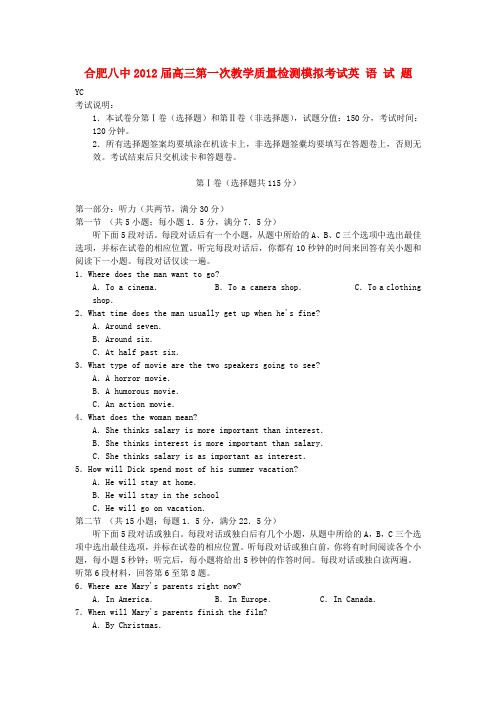
合肥八中2012届高三第一次教学质量检测模拟考试英语试题YC考试说明:1.本试卷分第Ⅰ卷(选择题)和第Ⅱ卷(非选择题),试题分值:150分,考试时间:120分钟。
2.所有选择题签案均要填涂在机读卡上,非选择题签橐均要填写在答题卷上,否则无效。
考试结束后只交机读卡和答题卷。
第Ⅰ卷(选择题共115分)第一部分:听力(共两节,满分30分)第一节(共5小题;每小题1.5分,满分7.5分)听下面5段对话。
每段对话后有一个小题,从题中所给的A、B、C三个选项中选出最佳选项,并标在试卷的相应位置。
听完每段对话后,你都有10秒钟的时间来回答有关小题和阅读下一小题。
每段对话仅读一遍。
1.Where does the man want to go?A.To a cinema.B.To a camera shop.C.To a clothing shop.2.What time does the man usually get up when he's fine?A.Around seven.B.Around six.C.At half past six.3.What type of movie are the two speakers going to see?A.A horror movie.B.A humorous movie.C.An action movie.4.What does the woman mean?A.She thinks salary is more important than interest.B.She thinks interest is more important than salary.C.She thinks salary is as important as interest.5.How will Dick spend most of his summer vacation?A.He will stay at home.B.He will stay in the schoolC.He will go on vacation.第二节(共15小题;每题1.5分,满分22.5分)听下面5段对话或独白。
2012届高三英语上册第三次段考检测试题(带答案)

2012届高三英语上册第三次段考检测试题(带答案)合肥八中2011~2012学年度第三次段考高三英语试卷本试卷分为第Ⅰ卷(选择题)和第Ⅱ卷(非选择题)两部分。
全卷满分150分,考试时间120分钟。
第I卷(选择题共115分)第一部分听力(共两节,满分30分)第一节(共5小题:每小题1.5分,满分7.5分)听下面5段对话。
每段对话后有一个小题,从题中所给的A、B、C三个选项中选出最佳选项,并标在试卷的相应位置。
听完每段对话后,你都有10秒钟的时间来回答有关小题和阅读下一小题。
每段对话仅读一遍。
1. When does the film start? A. At 7:30 pm. B. At 8:00 pm. C. At 8:15 pm. 2. What will the woman probably do this weekend? A. To learn painting. B. To buy some paintings in Africa. C. To see an exhibition about paintings. 3. Why doesn’t the man look happy? A. Because he cannot go to the Great Wall.B. Because he doesn’t know what to write for his English composition.C. Because he doesn’t know how to describe his impression of the Great Wall. 4. How many times has the man been late? A. Once. B. Twice. C. Three times. 5. Where does the woman work? A. In New York. B. In Maryland. C. In Washington. 第二节 (共15小题;每小题1.5分,满分22.5分) 听下面5段对话或独白。
安徽合肥八中2012届高三上学期第四次月考(英语).pdf
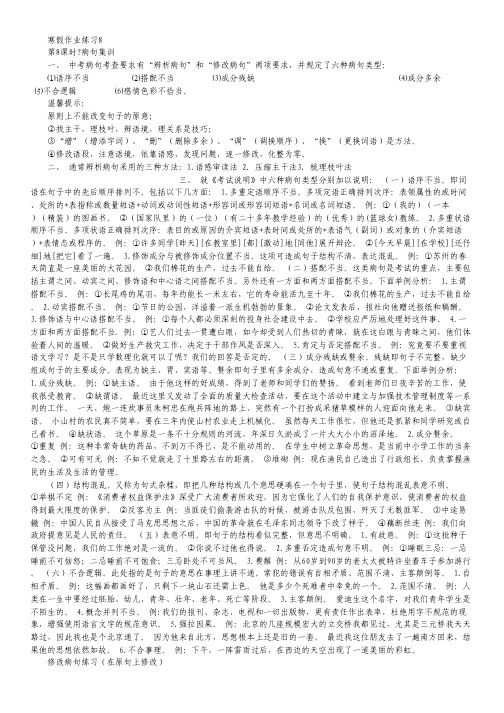
寒假作业练习8 第8课时?病句集训 一、 中考病句考查要求有“辨析病句”和“修改病句”两项要求,并规定了六种病句类型: ⑴语序不当 ⑵搭配不当 ⑶成分残缺 ⑷成分多余⑸不合逻辑 ⑹感情色彩不恰当。
温馨提示: 原则上不能改变句子的原意; ②找主干,理枝叶,辨语境,理关系是技巧; ③“增”(增添字词)、“删”(删除多余)、“调”(调换顺序)、“换”(更换词语)是方法。
④修改语段,注意语境,依靠语感,发现问题,逐一修改,化整为零。
二、 通常辨析病句采用的三种方法:1.语感审读法 2. 压缩主干法3. 梳理枝叶法三、 就《考试说明》中六种病句类型分别加以说明: (一)语序不当。
即词语在句子中的先后顺序排列不。
包括以下几方面: 1.多重定语顺序不当。
多项定语正确排列次序:表领属性的或时间、处所的+表指称或数量短语+动词或动词性短语+形容词或形容词短语+名词或名词短语。
例:①(我的)(一本)(精装)的图画书。
②(国家队里)的(一位)(有二十多年教学经验)的(优秀)的(篮球女)教练。
2.多重状语顺序不当。
多项状语正确排列次序:表目的或原因的介宾短语+表时间或处所的+表语气(副词)或对象的(介宾短语)+表情态或程序的。
例:①许多同学[昨天][在教室里][都][激动]地[同他]展开辩论。
②[今天早晨][在学校][还仔细]地[把它]看了一遍。
3.修饰成分与被修饰成分位置不当。
这项可造成句子结构不清,表达混乱。
例:①苏州的春天简直是一座美丽的大花园。
②我们棉花的生产,过去不能自给。
(二)搭配不当。
这类病句是考试的重点,主要包括主谓之间、动宾之间、修饰语和中心语之间搭配不当。
另外还有一方面和两方面搭配不当。
下面举例分析: 1.主谓搭配不当。
例:①长尾鸡的尾羽,每年约能长一米左右,它的寿命能活九至十年。
②我们棉花的生产,过去不能自给。
2.动宾搭配不当。
例:①节日的公园,洋溢着一派生机勃勃的景象。
安徽省合肥八中2012届高三高考适应性考试语文试题

安徽省合肥八中2012年高考适应性考试语文试题第I卷(阅读题共66分)一、(9分)阅读下面的文字,完成1~3题。
怎样看待时下的“孔子热”近年来,孔子俨然成了影视市场的“新宠”。
电影版《孔子》未播先热,佛山电视台投拍的电视剧版《孔子》只在拍摄中便赚足了眼球,湖南卫视组拍的电视剧《孔子春秋》也备受关注。
此外,舞剧版《孔子》已在山东曲阜上演,多部门联合制作的动画版《孔子》则正在央视熟播。
这些作品,无一例外对外宣告着同一个目标:“还原”孔子的一生。
没有哪一位古人或今人的生平,近几年来如此为影视界关注。
在这样一片热闹中,孔子俨然摇身一变,成了一位影视明星。
在近几年兴起的所谓“国学热”的大背景下,“孔子热”显然只是这种大背景的冰山一角。
借着这股“囡学热”的东风,作为当仁不让的中华传统文化第一人的孔子成为。
“熟点”似乎也是理所当然。
从某教授在“百家讲坛”栏目开讲《论语》心得一到电影《孔子》的拍摄,孔子经历了一个从殿堂、书斋、学院走向平民、社会、大众再走向娱乐、商业的过程。
说它是后现代式的“解构”也罢,说它是国学、文化的大众化、普及化也好,一个事实是,孔子离文化越来越远,而离娱永、商业越来越近。
娱乐、商业自然有其规则,所以绯闻可以了,穿越也出现了,时尚的、能赚眼球的元素一个都不能少,而有没有尊重历史、违反“常识”倒不是那么重要了。
可以想见,这样的“孔子热”与文化已经没有多少关系了,只是一个娱乐事件或娱乐现象,遑论所谓传承经典、“还原”孔子的一生这些宏大的题旨。
近年来方兴未艾的“文化产业化”浪潮也从另一个角度更有力地助推了“孔子热”。
就这一点来说,“孔子热”与近日引起各界广泛争议的“安阳曹操墓真假辨”实际上都是这种“文化搭台,经济唱戏”运作模式的产物。
当然,这样的模式也无可厚非,但是经济与利益的强势作用往往会使文化、真相成为一个“任人打扮的小姑娘”。
所以,需要警惕的是,文化被经济遮蔽、取代,而真相也被利益扭曲,同时,从一些中央级新闻媒体开始,如“开心学国学”栏目的开办,“国学娱乐化”也在近期成为一种潮流,这实际上也在某种程度上推进了“孔子热”。
安徽合肥八中2012届高三第四次月考英语试题
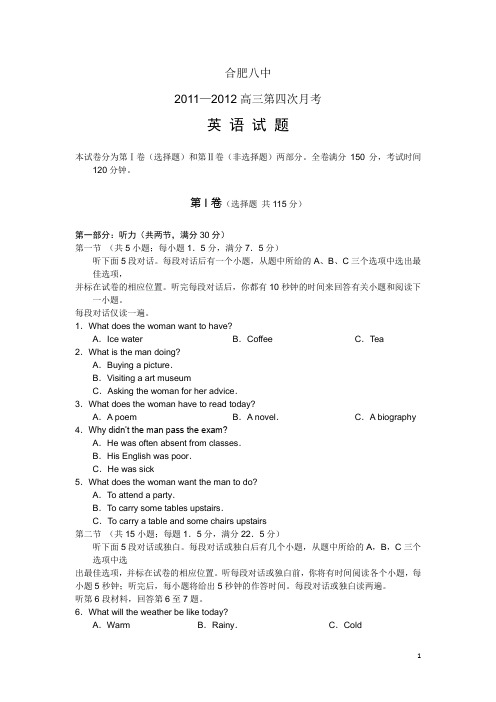
合肥八中2011—2012高三第四次月考英语试题本试卷分为第Ⅰ卷(选择题)和第Ⅱ卷(非选择题)两部分。
全卷满分150分,考试时间120分钟。
第I卷(选择题共115分)第一部分:听力(共两节,满分30分)第一节(共5小题;每小题1.5分,满分7.5分)听下面5段对话。
每段对话后有一个小题,从题中所给的A、B、C三个选项中选出最佳选项,并标在试卷的相应位置。
听完每段对话后,你都有10秒钟的时间来回答有关小题和阅读下一小题。
每段对话仅读一遍。
1.What does the woman want to have?A.Ice water B.Coffee C.Tea 2.What is the man doing?A.Buying a picture.B.Visiting a art museumC.Asking the woman for her advice.3.What does the woman have to read today?A.A poem B.A novel.C.A biography 4.Why didn’t the man pass the exam?A.He was often absent from classes.B.His English was poor.C.He was sick5.What does the woman want the man to do?A.T o attend a party.B.T o carry some tables upstairs.C.To carry a table and some chairs upstairs第二节(共15小题;每题1.5分,满分22.5分)听下面5段对话或独白。
每段对话或独白后有几个小题,从题中所给的A,B,C三个选项中选出最佳选项,并标在试卷的相应位置。
听每段对话或独白前,你将有时间阅读各个小题,每小题5秒钟;听完后,每小题将给出5秒钟的作答时间。
2012年安徽高考英语模拟试题及答案
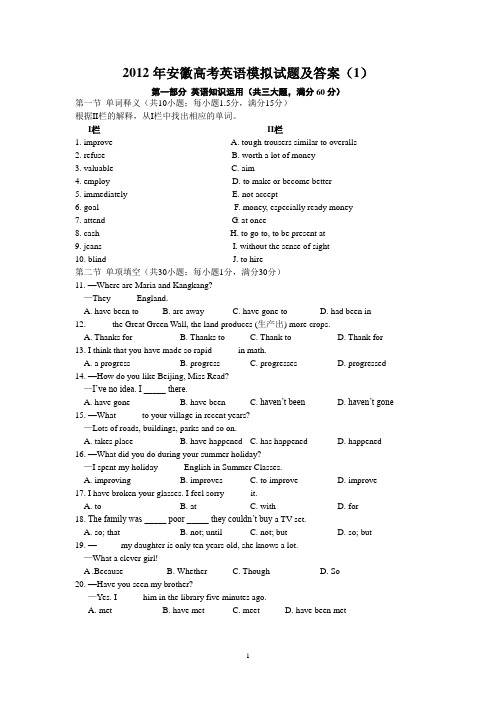
2012年安徽高考英语模拟试题及答案(1)第一部分英语知识运用(共三大题,满分60分)第一节单词释义(共10小题;每小题1.5分,满分15分)根据II栏的解释,从I栏中找出相应的单词。
I栏II栏1. improve A. tough trousers similar to overalls2. refuse B. worth a lot of money3. valuable C. aim4. employ D. to make or become better5. immediately E. not accept6. goal F. money, especially ready money7. attend G. at once8. cash H. to go to, to be present at9. jeans I. without the sense of sight10. blind J. to hire第二节单项填空(共30小题;每小题1分,满分30分)11. —Where are Maria and Kangkang?—They _____ England.A. have been toB. are awayC. have gone toD. had been in12. _____ the Great Green Wall, the land produces (生产出) more crops.A. Thanks forB. Thanks toC. Thank toD. Thank for13. I think that you have made so rapid _____ in math.A. a progressB. progressC. progressesD. progressed14. —How do you like Beijing, Miss Read?—I’ve no idea. I _____ there.A. have goneB. have beenC. haven’t beenD. haven’t gone15. —What _____ to your village in recent years?—Lots of roads, buildings, parks and so on.A. takes placeB. have happenedC. has happenedD. happened16. —What did you do during your summer holiday?—I spent my holiday _____ English in Summer Classes.A. improvingB. improvesC. to improveD. improve17. I have broken your glasses. I feel sorry _____ it.A. toB. atC. withD. for18. The family was _____ poor _____ they couldn’t buy a TV set.A. so; thatB. not; untilC. not; butD. so; but19. —_____ my daughter is only ten years old, she knows a lot.—What a clever girl!A .Because B. Whether C. Though D. So20. —Have you seen my brother?—Yes. I _____ him in the library five minutes ago.A.metB. have metC. meetD. have been met21. —They have been to Australia.—So _____ I.A. doB. have beenC. didD. have22. The population of Shanghai is larger than _____ of Shenyang.A. thatB. itC. oneD. this23. —_____ the population of the U.S.A. in 2005?—It _____ about 296 million.A. What is; isB. What was; wasC. How many is; wasD. How many was; is24. _____ of the teachers are women in our school.A. Two thirdB. Two threesC. Two thirdsD. Second three25. He’s read this book before, _____?A. hasn’t heB. doesn’t heC. isn’t heD. wasn’t he26. The _____ population may be the greatest challenge of the world today.A. increaseB. increasedC. increasingD. increases27. The little girl has _____ finished reading the book you lent her.A. alreadyB. yetC. stillD. once28. —What has happened in your hometown?—Great changes _____ in my hometown recently.A. have been taken placeB. have taken placeC. have been happenedD. was happened29. Students today have a lot of pressure(压力) _____ they have to learn too much knowledge atschool.A. in order toB. unlessC. becauseD. because of30. —I have never visited a paper factory.—_____A. So have I.B. So I have.C. Neither have I.D. I haven’t now.31. She has _____ this car for nearly ten years.A. buyB. boughtC. haveD. had32. You can’t trust what he said, you should go and _____ for yourself.A. lookB. seeC. findD. study33. —Is it interesting to play computer games?—Yes, _____ you are interested in playing computer games, you’ll have trouble giving it up.A. onceB. twiceC. asD. as soon as34. The supermarket provides customers _____ plastic bags for free.A. onB. withC. ofD. in35. I think it’s good _____ us _____ eat healthy food.A. for; toB. for; forC. to; forD. to; to36. We should do our best to help homeless people live a _____ life.A. happilyB. badC. normalD. terrible37. The traffic in the city _____ be terrible, but now it has improved a lot. I think you will _____ itsoon.A. use to; use toB. get used to; used toC. used to; get used toD. get used to; use to38. His father has worked in this factory _____ he came here in 1980.A. sinceB. forC. whenD. how long39. Project Hope is _____ to help the poor children go to school.A. aimB. aimingC. purposeD. wanting40. She _____ great progress in the past 2 years.A. madeB. had madeC. has madeD. make第三节完形填空(共10小题;每小题1.5分,满分15分)A professor(教授)told his students to go into the city slums (贫民窟) to study the life of 200 boys. He asked them to 41 reports about each boy’s life and future. One of the students wrote,“They don’t have any hope.”Twenty-five years 42 , another professor read about the earlier study. He told his students to 43 what had happened to the boys. They tried very hard and found that 176 of the boys had become successful 44 doctors, teachers and scientists.The professor was very 45 and decided to study it further. Luckily, all of them were living near the place and he was able to ask each one,“What made you 46 ?”Each one answered,“It was a teacher.”The teacher was 47 living there, so the professor found her and asked the old woman 48 she had done to pull those boys out of the slums, and change them 49 successful people.The teacher’s 50 began to shine and said with a sweet smile,“It’s really very easy. I love those boys.”41. A. read B. study C. write D. take42. A. later B. after C. ago D. before43. A. search B. find out C. look after D. see44. A. for B. with C. as D. like45. A. glad B. angry C. surprised D. worried46. A. wonderful B. successful C. rich D. popular47. A. already B. too C. even D. still48. A. what B. who C. which D. when49. A. on B. of C. from D. into50. A. face B. eyes C. hair D. mouth第二部分阅读理解(共20小题;每小题2分,满分40分)阅读下列短文,从每小题所给的A、B、C、D四个选项中选出最佳选项。
安徽省皖南八校2012届高三第三次联考(英语)[1]1
![安徽省皖南八校2012届高三第三次联考(英语)[1]1](https://img.taocdn.com/s3/m/8a384fc90508763231121293.png)
安徽省皖南八校2012届高三4月第三次联考试题英语考生注意:1. 本试卷分第I卷(选择題)和第II卷(非选择題)两部分,滴分150分,考试时间120分钟。
2. 答題前,考生务必用直径0. 5毫米黑色墨水签字笔将密封线内项目填写清楚3. 考生作答时,请将答案答在答題卷上。
第I卷每小題选出答案后,用2B铅笔把答題卷上对应題目的答案标号涂黑;第II卷请用直径0. 5毫米黑色墨水签字笔在答題卷上各題第I卷第一部分听力{共两节,满分30分)第一节(共5小题;每小题1.5分,满分7. 5分)听下面5段对话。
每段对话后有一个小题,从题中所给的A、B、C三个选项中选出最佳选项,并标在试卷的相应位置,听完每段对话后,你都有10秒钟的时间来回答有关小题和阅读下—小题。
每段对话仅读一遍。
1. What's the most probable relationship between the two speakers?A. Boss and secretary.B. Teacher and studentC. Husband and wife.2. When will the concert start?A. At 10:00.B. At 10:30.C. At 11:30.3. What does the man mean?A. The car is too expensive.B. The car isn't of good quality.C. The woman is always so careless.4. What can we know about Mr Johnson?A. He likes to help others.B. He is a tall young man.C. He is a sales manager.5. Where are the two speakers most probably working?A. At the post office.B. At a newspaper office.C. At an airport.第二节(共15小题;每小题1.5分,满分22. 5分)听下面5段对话或独白。
2012届合肥八中高三第01次教学质量检测适应性考试参考答案(1)
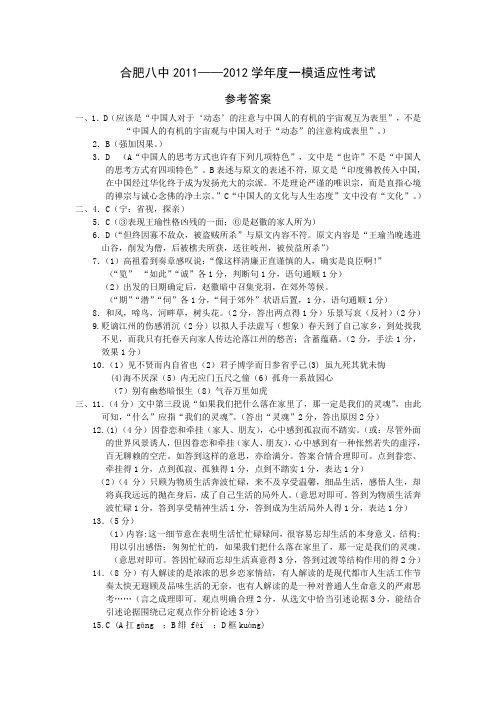
合肥八中2011——2012学年度一模适应性考试参考答案一、1.D(应该是“中国人对于‘动态’的注意与中国人的有机的宇宙观互为表里”,不是“中国人的有机的宇宙观与中国人对于“动态”的注意构成表里”。
)2.B(强加因果。
)3.D (A“中国人的思考方式也许有下列几项特色”,文中是“也许”不是“中国人的思考方式有四项特色”。
B表述与原文的表述不符,原文是“印度佛教传入中国,在中国经过华化终于成为发扬光大的宗派。
不是理论严谨的唯识宗,而是直指心境的禅宗与诚心念佛的净土宗。
”C“中国人的文化与人生态度”文中没有“文化”。
)二、4.C(宁:省视,探亲)5.C(③表现王瑜性格凶残的一面;⑥是赵徽的家人所为)6.D(“但终因寡不敌众,被盗贼所杀”与原文内容不符。
原文内容是“王瑜当晚逃进山谷,削发为僧,后被樵夫所获,送往岐州,被侯益所杀”)7.(1)高祖看到奏章感叹说:“像这样清廉正直谨慎的人,确实是良臣啊!”(“览”“如此”“诚”各1分,判断句1分,语句通顺1分)(2)出发的日期确定后,赵徽暗中召集党羽,在郊外等候。
(“期”“潜”“伺”各1分,“伺于郊外”状语后置,1分,语句通顺1分)8.和风,啼鸟,河畔草,树头花。
(2分,答出两点得1分)乐景写哀(反衬)(2分)9.贬谪江州的伤感消沉(2分)以拟人手法虚写(想象)春天到了自己家乡,到处找我不见,而我只有托春天向家人传达沦落江州的愁苦;含蓄蕴藉。
(2分,手法1分,效果1分)10.(1)见不贤而内自省也(2)君子博学而日参省乎己(3) 虽九死其犹未悔(4)海不厌深(5)内无应门五尺之僮(6)孤舟一系故园心(7)别有幽愁暗恨生(8)气吞万里如虎三、11.(4分)文中第三段说“如果我们把什么落在家里了,那一定是我们的灵魂”,由此可知,“什么”应指“我们的灵魂”。
(答出“灵魂”2分,答出原因2分)12.(1)(4分)因眷恋和牵挂(家人、朋友),心中感到孤寂而不踏实。
(或:尽管外面的世界风景诱人,但因眷恋和牵挂(家人、朋友),心中感到有一种怅然若失的虚浮,百无聊赖的空茫。
2012年安徽省高考自主命题英语仿真试卷[8].pdf
![2012年安徽省高考自主命题英语仿真试卷[8].pdf](https://img.taocdn.com/s3/m/2e0d8a00daef5ef7bb0d3c97.png)
一、自然资总4月22日 世界地球日)
1、自然资对类阳矿产
2、分类生资生资
3、特点总种类对短资6月25日 世界土地日)
1、利用类为农业设为农业
2、各类难备资
3、我国资点优势:总类齐为国发农渔产条势:结资严
4、分布地区⑴耕地和林地主要分布在气候湿润的东风区这东⑵草地主要分布在年平均降水量不足400毫米的西部内陆地区这难资业⑶北方旱地与南方水田的差异:北方地多水少,以旱地为为
5、存在的问题乱
6、基本国实护资3月22日世界水日;3月22-28日 中国1、水是宝贵的资⑴地球上的水97是海洋水,淡水资绝为两层类资浅层仅资0.3。
⑵水危机的原因:用水量增加、水污染、水浪费2、水资时空⑴时间际变国资源地区为资兴库域调黄济北调
⑵空间东别是华北区为严国土资进剧状况⑶措施:
①解决节②解决空间③节约⑷南水北调条计线①东线江苏扬长江进运河用闸级过黄河水,直达②中线从库华北峡库峡渠输进汉③西线计砻开凿长江黄河,补3、我国资点资时空
初中学习网,资料共分享!我们负责传递知识!。
合肥八中英语
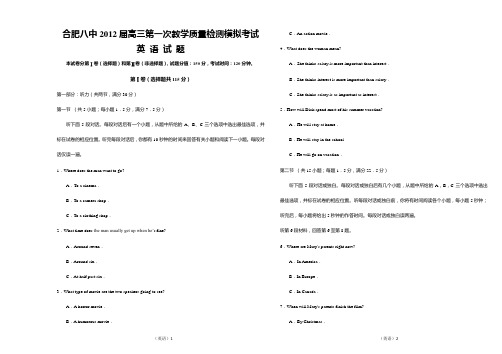
合肥八中2012届高三第一次教学质量检测模拟考试英语试题本试卷分第Ⅰ卷(选择题)和第Ⅱ卷(非选择题),试题分值:150分,考试时间:120分钟。
第Ⅰ卷(选择题共115分)第一部分:听力(共两节,满分30分)第一节(共5小题;每小题1.5分,满分7.5分)听下面5段对话。
每段对话后有一个小题,从题中所给的A、B、C三个选项中选出最佳选项,并标在试卷的相应位置。
听完每段对话后,你都有10秒钟的时间来回答有关小题和阅读下一小题。
每段对话仅读一遍。
1.Where does the man want to go?A.To a cinema.B.To a camera shop.C.To a clothing shop.2.What time does the man usually get up when he’s fine?A.Around seven.B.Around six.C.At half past six.3.What type of movie are the two speakers going to see?A.A horror movie.B.A humorous movie.C.An action movie.4.What does the woman mean?A.She thinks salary is more important than interest.B.She thinks interest is more important than salary.C.She thinks salary is as important as interest.5.How will Dick spend most of his summer vacation?A.He will stay at home.B.He will stay in the schoolC.He will go on vacation.第二节(共15小题;每题1.5分,满分22.5分)听下面5段对话或独白。
【最新】安徽省合肥八中2012届高三第二次段考英语试题.pdf

人教版语文七年级上第7课《短文两篇》学案 教师寄语:一心为了他人的事业才是神圣的;“生命中的第一次愈多,生命也就愈益多姿多彩。
”反复朗读课文 三、合作释疑 1.为什么行道树认定自己的事业是神圣的?从事“神圣的事业”的行道树承受了哪些痛苦?既然痛苦,为什么“自己选择”这种命运? 2.《行道树》首尾两段前后照应,但在语序和用词上又稍有不同,为什么? 3、《第一次真好》中为什么说结实累累的柚子树是“一幅秋日风情画”,不说是“风景画”“风光画”? 4. 短文末句说:“愿你珍重第一次”的含义是什么? 四、课内精读 阅读下列文段,完成(1)~(5)题。
①第一次真好,第一次的感觉真奇妙。
细细回想:在你的生命中,有多少“第一次”值得你低回品味?有多少“第一次”给你留下不可磨灭的印象? ②几年前,家中第一次养了一笼十姊妹。
当母鸟第一次生下了几颗玲珑剔透,比小指头还小的的鸟蛋以后,我和孩子们便眼巴巴地等候小岛孵出来。
有一天,我们正在吃午饭,孩子忽然大叫:“小鸟孵出来了。
”我惊喜地走到鸟笼边一看,在鸟巢里面的所谓小鸟,_________________________________。
第一次看到刚孵出来的雏鸟,但觉它们的样子很难看,竟因此而吃不下饭。
可是,等到它们渐渐长大,羽毛渐丰,一切都具体而微以后,我喜欢它们又甚于那些老鸟。
③第一次生孩子时,护士把包在襁褓中,只露出一张红彤彤小脸的老大抱来放在我的身边。
我第一次看到从自己身体中分出来的骨肉,第一次看到如此鲜嫩的,才出生不到一个钟头的婴儿,心情非常复杂,又兴奋又新奇又紧张,只是目不转睛地望着他,惟恐这脆弱的小生命随时消失。
(l)下面是选文②段空白处原有的句子,句序已打乱,请调整句序。
A.身上只有稀疏的几根毛B.仅仅具有鸟的雏形C.只是两团小小的粉红色的肉球D.两只黑黑的眼睛却奇大 正确的句序是:___________________________________ (2)课文开头既说柚子树“不见得很美”。
【恒心】【好卷速递】安徽省合肥八中2012届高三第五次段考试试题(英语)
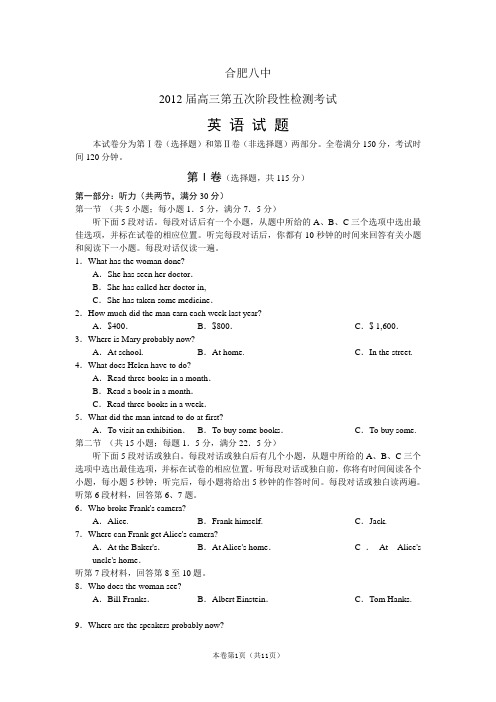
合肥八中2012届高三第五次阶段性检测考试英语试题本试卷分为第Ⅰ卷(选择题)和第Ⅱ卷(非选择题)两部分。
全卷满分150分,考试时间120分钟。
第I卷(选择题,共115分)第一部分:听力(共两节,满分30分)第一节(共5小题;每小题1.5分,满分7.5分)听下面5段对话。
每段对话后有一个小题,从题中所给的A、B、C三个选项中选出最佳选项,并标在试卷的相应位置。
听完每段对话后,你都有10秒钟的时间来回答有关小题和阅读下一小题。
每段对话仅读一遍。
1.What has the woman done?A.She has seen her doctor.B.She has called her doctor in,C.She has taken some medicine.2.How much did the man earn each week last year?A.$400.B.$800.C.$ 1,600.3.Where is Mary probably now?A.At school. B.At home. C.In the street. 4.What does Helen have to do?A.Read three books in a month.B.Read a book in a month.C.Read three books in a week.5.What did the man intend to do at first?A.To visit an exhibition. B.To buy some books.C.To buy some. 第二节(共15小题;每题1.5分,满分22.5分)听下面5段对话或独白。
每段对话或独白后有几个小题,从题中所给的A、B、C三个选项中选出最佳选项,并标在试卷的相应位置。
听每段对话或独白前,你将有时间阅读各个小题,每小题5秒钟;听完后,每小题将给出5秒钟的作答时间。
安徽省合肥八中2012届高三第三次段考试题--英语

安徽省合肥八中2012届高三第三次阶段性考试英语试题本试卷分为第Ⅰ卷(选择题)和第Ⅱ卷(非选择题)两部分。
全卷满分150分,考试时间120分钟。
第I卷(选择题共115分)第一部分听力(共两节,满分30分)第一节(共5小题:每小题1.5分,满分7.5分)听下面5段对话。
每段对话后有一个小题,从题中所给的A、B、C三个选项中选出最佳选项,并标在试卷的相应位置。
听完每段对话后,你都有10秒钟的时间来回答有关小题和阅读下一小题。
每段对话仅读一遍。
1.When does the film start?A.At 7:30 pm.B.At 8:00 pm.C.At 8:15 pm.2.What will the woman probably do this weekend?A.To learn painting.B.To buy some paintings in Africa.C.To see an exhibition about paintings.3.Why doesn’t the man look happy?A.Because he cannot go to the Great Wall.B.Because he doesn’t know what to write for his English composition.C.Because he doesn’t know how to describe his impression of the Great Wall.4.How many times has the man been late?A.Once.B.Twice.C.Three times.5.Where does the woman work?A.In New York.B.In Maryland.C.In Washington.第二节(共15小题;每小题1.5分,满分22.5分)听下面5段对话或独白。
安徽省合肥八中高三英语第二次段考试题北师大版

安徽省合肥八中2012届高三上学期第二次段考(英语)本试卷分为第Ⅰ卷(选择题)和第Ⅱ卷(非选择题)两部分。
共150分,考试时间120分钟。
第I卷(共两部分,共115分)第一部分:听力(共两节,满分30分)第一节(共5小题;每小题1.5分,满分7.5分)听下面5段对话。
每段对话后有一个小题,从题中所给的A、B、C三个选项中选出最佳选项,并标在试卷的相应位置。
听完每段对话后,你都有10秒钟的时间来回答有关小题和阅读下一小题。
每段对话仅读一遍。
1.What is the woman probably?A.A nurse.B.A policewoman C.A.saleswoman.2.What are these people going to do?A.Call their friend.B.Wait a little longer.C.Go back home-3.Where does the conversation most probably take place?A.On the film-making spot.B.Behind a big window.C.Just in the snow.4.What can you learn about the man?A.He is quite confident.B.He is very slow.C.He is rather upset.5.How much did the man's wife pay for her cost?A.$80.B.$240.C.$120.第二节(共15小题;每题1.5分,满分22.5分)听下面5段对话或独白。
每段对话或独白后有几个小题,从题中所给的A,B,C三个选项中选出最佳选项,并标在试卷的相应位置。
听每段对话或独白前,你将有时间阅读各个小题,每小题5秒钟;听完后,每小题将给出5秒钟的作答时间。
每段对话或独白读两遍。
2012年高考英试卷真题 安徽省

2012年普通高等学校招生全国统一考试(安徽卷)英语第Ⅰ卷(选择题共50分)第一部分听力(共两节,满分30分)回答听力部分时,请先将答案标在试卷上。
听力部分结束前,你将有两分钟的时间将您的答案转涂到客观答题卡上。
第一节(共5小题:每小题1.5分,满分7.5分)听下面5段对话,每段对话后有一个小题,从题中所给的A、B、C三个选项选出最佳选项,并标在试卷的相应位置,听完每段对话后,你都有10秒钟的时间来回答有关小题和阅读下小题,每段对话仅读一遍。
例:How much is the shirt?A. ξ19.15.B. ξ9.15.C. ξ9.18答案是B。
1. Where does this conversation probably take place?A. In a bookstore.B. In a classroomC. In a library2. At what time will the film begin?A. 7:20B. 7:15C.7:003. What are the two speakers mainly talking about?A. Their friend Jane.B. A weekend tripC.A radio programme4. What will the woman probably do?A. Catch a trainB. See the man offC. Go shopping5. Why did the woman apologize?A. She made a late deliveryB. She went to the wrong placeC. She couldn’t take the cake back第二节(共15小题:每小题1.5分,满分22.5分)听下面5段对话。
每段对话有几个小题,从题中所给的A、B、C三个选项中选出的最佳选项,并标在试卷的相应位置。
- 1、下载文档前请自行甄别文档内容的完整性,平台不提供额外的编辑、内容补充、找答案等附加服务。
- 2、"仅部分预览"的文档,不可在线预览部分如存在完整性等问题,可反馈申请退款(可完整预览的文档不适用该条件!)。
- 3、如文档侵犯您的权益,请联系客服反馈,我们会尽快为您处理(人工客服工作时间:9:00-18:30)。
安徽省合肥八中2012年高考适应性考试英语试题本试卷分为第Ⅰ卷(选择题)和第Ⅱ卷(非选择题)两部分.共150分,考试时间120分钟.注意事项:1.答第I卷前,考生务必将自己的姓名、准考证号、考试科目用铅笔涂写在答题卡上。
2.每小题选出答案后,用铅笔把答题卡上对应题目的答案标号涂黑。
如需改动,用橡皮擦干净后,再选涂其它答案标号。
不能答在试卷上。
第I卷(共115分)第一部分:听力(满分30分)做题时,先将答案划在试卷上。
录音内容结束后,你将有两分钟的时间将试卷上的答案转涂到答题卡上。
第一节(共5小题;每小题1.5分,满分7.5分)听下面5段对话。
每段对话后有一个小题,从题中所给的A、B、C三个选项中选出最佳选项,并标在试卷的相应位置。
听完每段对话后,你都有10秒钟的时间来回答有关小题和阅读下一小题。
每段对话仅读一遍。
1.What will Dorothy do on the weekend?A.Go out with her friend. B.Work on her paper. C.Make some plans.2.What was the normal price of the T – shirt?A.$15. B.$30. C.$50.3.What has the woman decided to do on Sunday afternoon?A.To attend a wedding. B.To visit an exhibition. C.To meet a friend.4.When does the bank close on Saturday?A.At 1:00 pm.B.At 3:00 pm. C.At 4:00 pm.5.Where are the speakers?A.In a store. B.In a classroom. C.At a hotel.第二节(共15小题;每题1.5分,满分22.5分)听下面5段对话或独白。
每段对话或独白后有几个小题,从题中所给的A,B,C三个选项中选出最佳选项,并标在试卷的相应位置。
听每段对话或独白前,你将有时间阅读各个小题,每小题5秒钟;听完后,每小题将给出5秒钟的作答时间。
每段对话或独白读两遍。
听第6段材料,回答第6—7题。
6.What do we know about Nora?A.She prefers a room of her own.B.She like to work with other girls.C.She lives near the city center.7.What is good about the flat?A.It has a large sitting room.B.It has good furniture.C.It has a big kitchen.听第7段材料,回答第8—10题。
8.Where has Barbara been?A.Milan. B.Florence. C.Rome.9.What has Barbara got in her suitcase?A.Shoes. B.Stones. C Books.听第8段材料,回答题11—13题10.Who is making the telephone call?A.Thomas Brothers. B.Mike Landon. C.Jack Cooper.11.What relation is the woman to Mr.Cooper?A.His wife B.His boss.C.His secretary.12.What is the message about?A.A meeting. B.A visit to France. C.The date for a trip.听第9段材料,回答第14—16 题13.Who could the man speaker most probably be?A.A person who saw the accident.B.The driver of the lorry.C.A police officer.14.What was Mrs.Franks doing when the accident took place?A.Walking along Churchill Avenue.B.Getting ready to cross the road.C.Standing outside a bank.15.When did the accident happen?A.At about 8:00am. B.At about 9: 00am. C.At about 10: 00am. 16.How did the accident happen?A.A lorry hit a car.B.A car ran into a lorry.C.A bank clerk rushed into the street.听第10材料,回答第17—20题17.What is the talk mainly about?A.The history of the school. B.The courses for the term. C.The plan for the day.18.Where can the visitors learn about the subjects for new students?A.In the school hall. B.In the science labs. C.In the classrooms.19.What can students do in the practical areas?A.Take science courses. B.Enjoy excellent meals. C.Attend workshops.20.When are the visitors expected to ask questions?A.During the lunch hour.B.After the welcome speech.C.Before the tour of the labs.第二部分英语知识运用(共两节,满分45 分)第一节: 语法和词汇知识(共15 小题; 每小题1分,满分15 分)从 A 、 B 、C、D 四个选项中,选出可以填人空自处的最佳选项,并在答题卡上将该项涂黑。
21.It is world of wonders, world where anything can happen.A.a ;the B.the; a C.a ;a D./;/22.—Can you shoot that bird at the top of the tree?—No, it's out of .A.range B.reach C.control D.order 23.The fierce competition of this international tennis tournament ended in a tie, 3-3, so the two sides are _____neck and neck.A.lightly B.slightlyC.continuously D.fundamentally24.I ____ my homework to make sure that nothing had been missed.A.went through B.got through C.broke through D.looked through 25.—You speak very good Chinese.—Thanks, I _____ it for 4years before I came to China.A.studied B.study C.was studying D.had studied 26.The beautiful mountain village ____we spent our holiday last year is located in ____is now part of Hefei.A.which; where B.where; what C.that; what D.when; which 27.—I'd rather have some wine if you don't mind.—____.Don't forget you will drive.A.Anything but that B.By all means C.Take it easy D.I won't say no to this28.I suggest the plan you referred to ____ as soon as possible.A.is carried out B.should carry out C.be carried out D.being carried out29.___everything to go wrong in advance, and you won't feel quite down when it does.A.Having expected B.ExpectC.To expect D.Expecting30.I think we should "_____as much emphasis on preventing the disease as we do on curing it.A.lay B.lie C.fix D.spend 31.He didn't know how to work out this problem.___, there was nobody who could help him.A.That's to say B.Or rather C.In other words D.To make matters worse32.The old man had four sons; all of died during the war.A.them B.which C.whom D.that 33.—She didn't take the medicine last night, did she?—.A.No, but I wish she wouldn't B.No, but I wish she hadC.Yes, but I wish she did D.Yes, but I wish she would34.Being asked if he could come to the party that night, _____.A.nobody said anything B.they didn't get an answer from him C.nothing was said by him D.John nodded his head and left the room 35.Although all of the apples _____, none of them ____ good.A .have tasted ; taste B.have been tasted; are tastedC.have been tasted; taste D.have tasted; are tasted第二节:完形填空(共20小题:每小题1.5分,满分30分)阅读下面短文,从短文后各题所给的四个选项(A、B、C和D)中,选出可以填入空白处的最佳选项,并在答题卡上将该项涂黑。
